This Week in Labor History
May 22
Eugene V. Debs imprisoned in Woodstock, Ill., for role in Pullman strike – 1895
 (The Bending Cross: A Biography of Eugene V. Debs: Eugene V. Debs was a labor activist in the late 19th and early 20th centuries who captured the heart and soul of the nation’s working people. He was brilliant, sincere, compassionate and scrupulously honest. A founder of one of the nation’s first industrial unions, the American Railway Union, he went on to help launch the Industrial Workers of the World — the Wobblies. A man of firm beliefs and dedication, he ran for President of the United States five times under the banner of the Socialist Party, in 1912 earning 6 percent of the popular vote.)While white locomotive firemen on the Georgia Railroad strike, Blacks who are hired as replacements are whipped and stoned—not by the union men, but by white citizens outraged that Blacks are being hired over Whites. The Engineers union threatens to stop work because their members are being affected by the violence – 1909Civil Service Retirement Act of 1920 gives federal workers a pension – 1920President Lyndon B. Johnson announces the goals of his Great Society social reforms: to bring “an end to poverty and racial injustice” in America – 1964 (The Bending Cross: A Biography of Eugene V. Debs: Eugene V. Debs was a labor activist in the late 19th and early 20th centuries who captured the heart and soul of the nation’s working people. He was brilliant, sincere, compassionate and scrupulously honest. A founder of one of the nation’s first industrial unions, the American Railway Union, he went on to help launch the Industrial Workers of the World — the Wobblies. A man of firm beliefs and dedication, he ran for President of the United States five times under the banner of the Socialist Party, in 1912 earning 6 percent of the popular vote.)While white locomotive firemen on the Georgia Railroad strike, Blacks who are hired as replacements are whipped and stoned—not by the union men, but by white citizens outraged that Blacks are being hired over Whites. The Engineers union threatens to stop work because their members are being affected by the violence – 1909Civil Service Retirement Act of 1920 gives federal workers a pension – 1920President Lyndon B. Johnson announces the goals of his Great Society social reforms: to bring “an end to poverty and racial injustice” in America – 1964
May 23
An estimated 100,000 textile workers, including more than 10,000 children, strike in the Philadelphia area. Among the issues: 60-hour workweeks, including night hours, for the children – 1903
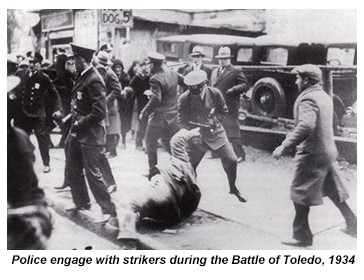 The Battle of Toledo begins today: a five-day running battle between roughly 6,000 strikers at the Electric Auto-Lite company of Toledo, Ohio, and 1,300 members of the Ohio National Guard. Two strikers died and more than 200 were injured. The battle began in the sixth week of what ultimately became a successful two-month fight for union recognition and higher pay. One guardsman told a Toledo Blade reporter: “Our high school graduation is… tonight and we were supposed to be getting our diplomas” – 1934 The Battle of Toledo begins today: a five-day running battle between roughly 6,000 strikers at the Electric Auto-Lite company of Toledo, Ohio, and 1,300 members of the Ohio National Guard. Two strikers died and more than 200 were injured. The battle began in the sixth week of what ultimately became a successful two-month fight for union recognition and higher pay. One guardsman told a Toledo Blade reporter: “Our high school graduation is… tonight and we were supposed to be getting our diplomas” – 1934
U.S. railroad strike starts, later crushed when President Truman threatens to draft strikers – 1946
The Granite Cutters Int’l Association of America merges with Tile, Marble, Terrazzo, Finishers & Shopmen, which five years later merged into the Carpenters – 1983
May 24
After 14 years of construction and the deaths of 27 workers, the Brooklyn Bridge over New York’s East River opens. Newspapers call it “the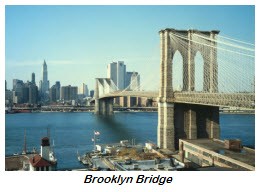 eighth wonder of the world” – 1883 eighth wonder of the world” – 1883
Some 2,300 members of the United Rubber Workers, on strike for 10 months against five Bridgestone-Firestone plants, agree to return to work without a contract. They had been fighting demands for 12-hour shifts and wage increases tied to productivity gains – 1995
May 25
Striking shoemakers in Philadelphia are arrested and charged with criminal conspiracy for violating an English common law that bars schemes aimed at forcing wage increases. The strike was broken – 1805
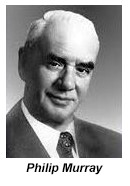 Philip Murray is born in Scotland. He went on to emigrate to the U.S., become founder and first president of the United Steelworkers of America, and head of the Congress of Industrial Organizations (CIO) from 1940 until his death in 1952 – 1886 Philip Murray is born in Scotland. He went on to emigrate to the U.S., become founder and first president of the United Steelworkers of America, and head of the Congress of Industrial Organizations (CIO) from 1940 until his death in 1952 – 1886
Two company houses occupied by non-union coal miners are blown up and destroyed during a strike against the Glendale Gas & Coal Co. in Wheeling, W. Va. – 1925
Thousands of unemployed WWI veterans arrive in Washington, D.C., to demand early payment of a bonus they had been told they would get, but not until 1945. They built a shantytown near the U.S. Capitol but were burned out by U.S. troops after two months – 1932
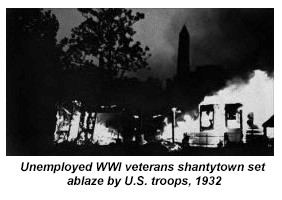 The notorious 11-month Remington Rand strike begins. The strike spawned the “Mohawk Valley (N.Y.) formula,” described by investigators as a corporate plan to discredit union leaders, frighten the public with the threat of violence, employ thugs to beat up strikers, and other tactics. The National Labor Relations Board termed the formula “a battle plan for industrial war” – 1936 The notorious 11-month Remington Rand strike begins. The strike spawned the “Mohawk Valley (N.Y.) formula,” described by investigators as a corporate plan to discredit union leaders, frighten the public with the threat of violence, employ thugs to beat up strikers, and other tactics. The National Labor Relations Board termed the formula “a battle plan for industrial war” – 1936
The AFL-CIO begins what is to become an unsuccessful campaign for a 35-hour workweek, with the goal of reducing unemployment. Earlier tries by organized labor for 32- or 35-hour weeks also failed – 1962
May 26
Men and women weavers in Pawtucket, R.I., stage nation’s first “co-ed” strike – 1824
Western Federation of Miners members strike for 8-hour day, Cripple Creek, Colo. – 1894
Actors’ Equity Assn. is founded by 112 actors at a meeting in New York City’s Pabst Grand Circle Hotel. Producer George M. Cohan responds: “I will drive an elevator for a living before I will do business with any actors’ union.” Later a sign will appear in Times Square reading: “Elevator operator wanted. George M. Cohan need not apply” – 1913
 (Coping with Difficult People: Bosses, supervisors, co-workers, friends, family members… difficult people can make your life hell, but you can do something about it. Based on fourteen years of research and observation, Coping with Difficult People offers proven, effective techniques guaranteed to help you right the balance in bad relationships and take charge of your life.) (Coping with Difficult People: Bosses, supervisors, co-workers, friends, family members… difficult people can make your life hell, but you can do something about it. Based on fourteen years of research and observation, Coping with Difficult People offers proven, effective techniques guaranteed to help you right the balance in bad relationships and take charge of your life.)
IWW Marine Transport Workers strike, Philadelphia – 1920
Some 100,000 steel workers and miners in mines owned by steel companies strike in seven states. The Memorial Day Massacre, in which ten strikers were killed by police at Republic Steel in Chicago, took place four days later, on May 30 – 1937
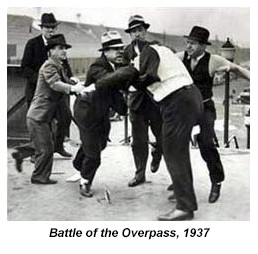 Ford Motor Co. security guards attack union organizers and supporters attempting to distribute literature outside the plant in Dearborn, Mich., in an event that was to become known as the “Battle of the Overpass.” The guards tried to destroy any photos showing the attack, but some survived—and inspired the Pulitzer committee to establish a prize for photography – 1937 Ford Motor Co. security guards attack union organizers and supporters attempting to distribute literature outside the plant in Dearborn, Mich., in an event that was to become known as the “Battle of the Overpass.” The guards tried to destroy any photos showing the attack, but some survived—and inspired the Pulitzer committee to establish a prize for photography – 1937
May 27
The U.S. Supreme Court declares the Depression-era National Industrial Recovery Act to be unconstitutional, about a month before it was set to expire – 1935
The CIO-affiliated Insurance Workers of America merges with its AFL counterpart, the Insurance Agents International Union to form the Insurance Workers International Union. The union later became part of the United Food and Commercial Workers – 1959
May 28
The Ladies Shoe Binders Society formed in New York – 1835
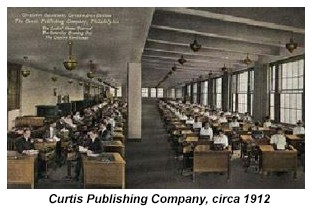 Fifteen women were dismissed from their jobs at the Curtis Publishing Company in Philadelphia for dancing the Turkey Trot. They were on their lunch break, but management thought the dance too racy – 1912 Fifteen women were dismissed from their jobs at the Curtis Publishing Company in Philadelphia for dancing the Turkey Trot. They were on their lunch break, but management thought the dance too racy – 1912
At least 30,000 workers in Rochester, N.Y., participate in a general strike in support of municipal workers who had been fired for forming a union – 1946
—Compiled and edited by David Prosten |